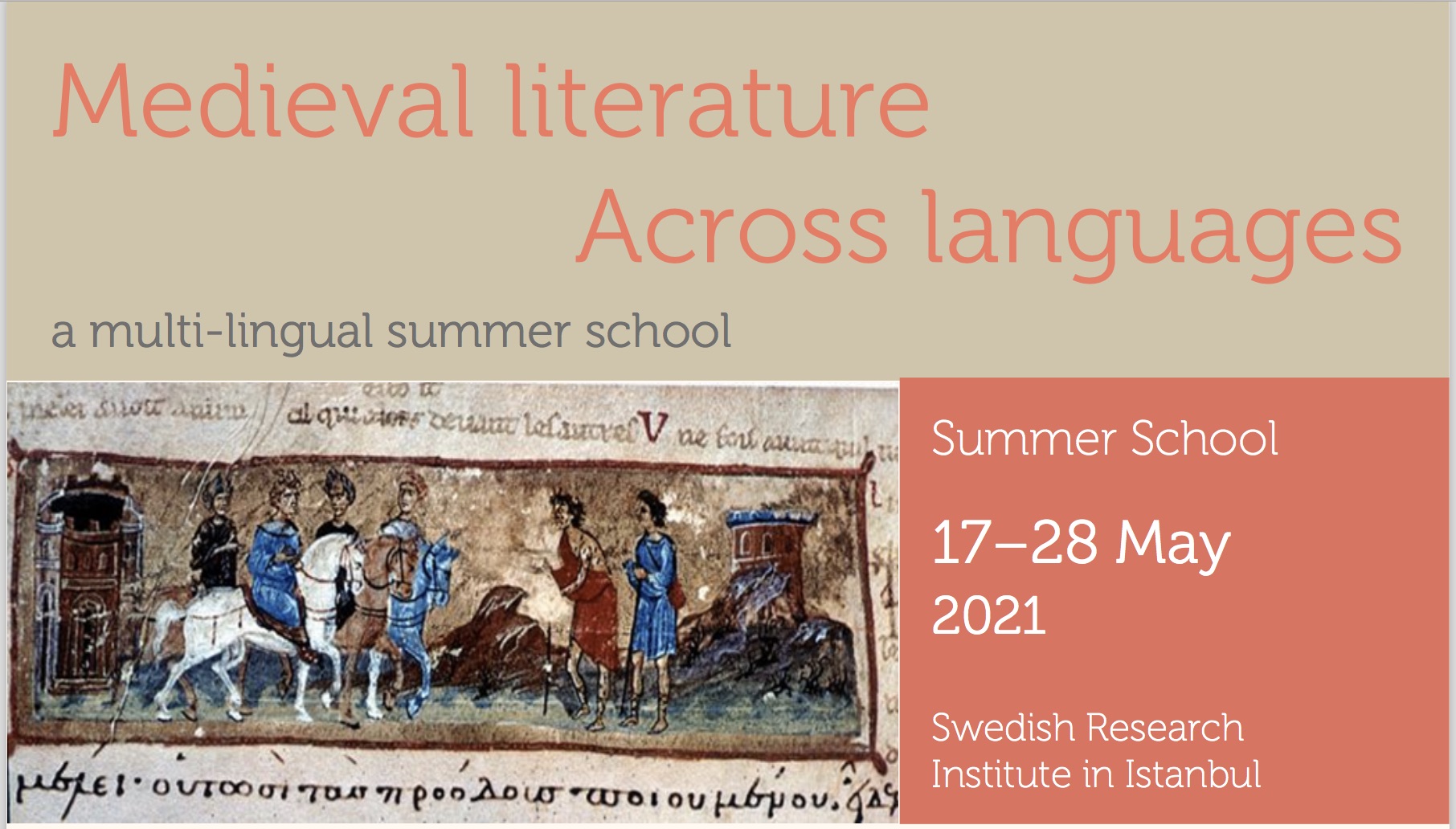
Summer School: Medieval Literature Across Languages
Summer School 17-28 May 2021 organised by Retracing Connections (Uppsala University) and Centre for Medieval Literature. This online summer school seeks to provide PhD students with a first immersion into the study of medieval literature across languages.
This online summer school seeks to provide PhD students with a first immersion into the study of medieval literature across languages. Language training, with the aim of inviting PhD students to become acquainted with new medieval languages, will here be combined with lectures on case studies, addressing various methodological issues and approaches. The summer school focuses on five medieval languages: Georgian, Arabic, Greek, Latin, and Old French. Together these languages cover an immense geographical and literary expanse, yet they all involved various areas of the Eastern Mediterranean.
Texts of obvious interest are the story of Barlaam and Ioasaph (Josafat), the Alexander Romance, the Secretum Secretorum, the fables of Kalila wa-Dimna, the Apocalypse of Ps-Methodius, and Scriptures (the Bible, the Qur’an). These were all far-travelling texts, whose long trajectories and multiple linguistic interpretations elicit surprise and interest. Through language study, lectures, and by reading together the same text (e.g., the Barlaam and Ioasaph) across five different languages, the summer school aims to show how these literatures worked as a multi-lingual common resource.
The summer school will explore the exchanges and mutual enrichment between medieval languages and literatures. Key texts and entire literary genres passed from one language to another through the intense work of translators and thereby made a significant impact on their target world, just as they themselves underwent changes in order to speak to it. Indian texts travelled far and reached the Mediterranean through multiple translations; Greek philosophy journeyed to Khorasan and beyond, primarily in Arabic translations; romances and fables created inter-continental chains of literary inter- connectedness.
These themes have received increased scholarly attention in recent years, and the study of these processes holds great promise and interest to a world searching for models of how to write global (hi)stories of past cultural exchange. Some impediments, however, often hold back students within these fields: the lack of linguistic proficiency and methodological concerns (can and should we compare, and if so, how? which cultural implications can we deduce from translations, often the product of a single and perhaps exceptional person? are we exaggerating transcultural aspects in the light of modern interests? etc.).
Programme
Note: The programme has been changed to a completely online format to address the ongoing barriers to travel. All instruction will take place online between 14:00-17:00 (CEST, Danish local time).
The online summer school will be organized around language teaching and tutoring, lectures and presentations, and an introduction to TEI encoding. Substantial work will be required of students in advance of the summer school (learning of new alphabets, initial reading and encoding exercises).
Organizers of the summer school are Julian Yolles (University of Southern Denmark) and Christian Høgel (University of Southern Denmark).
Among confirmed lecturers are Stratis Papaioannou (University of Crete, Rethymno) and Lars Boje Mortensen (University of Southern Denmark).
Practical information
Applications
Applications should be sent before 15 December 2020 to hogel@sdu.dk.
We encourage applications from PhD students from any field in medieval studies. Applicants are asked to specify one language they wish to study, and at least one language they can offer tutoring in (please indicate level of proficiency).
Lectures and seminars will be held in English. Your application should include an abstract of your current research and a statement addressing the contributions you can make to the summer school and what you hope to gain from participating (together no more than a single A4 page, single spaced). You must also name one referee who will be willing to write in support of your application. Referees of short-listed applicants will be contacted directly by the organizers of the summer school.
There is no cost for attending the Summer School.
Language Teaching
Beginning each day at 14:00 (CEST) language teaching will be followed by language tutoring, in which PhD students assist each other as tutors and will themselves receive help from others.
Lectures and Presentations
On alternating days, invited speakers will deliver lectures on a range of topics related to the study of medieval literatures across languages; on other days, students will be expected to deliver short presentations on their findings.
TEI Encoding
Students will receive an introduction to encoding texts using a TEI compliant architecture of XML tagging. Prior to the summer school, students will be provided with preliminary orientation materials; during the summer school, they will receive hands-on experience encoding a short section of the Barlaam and Josaphat text in their chosen target language.